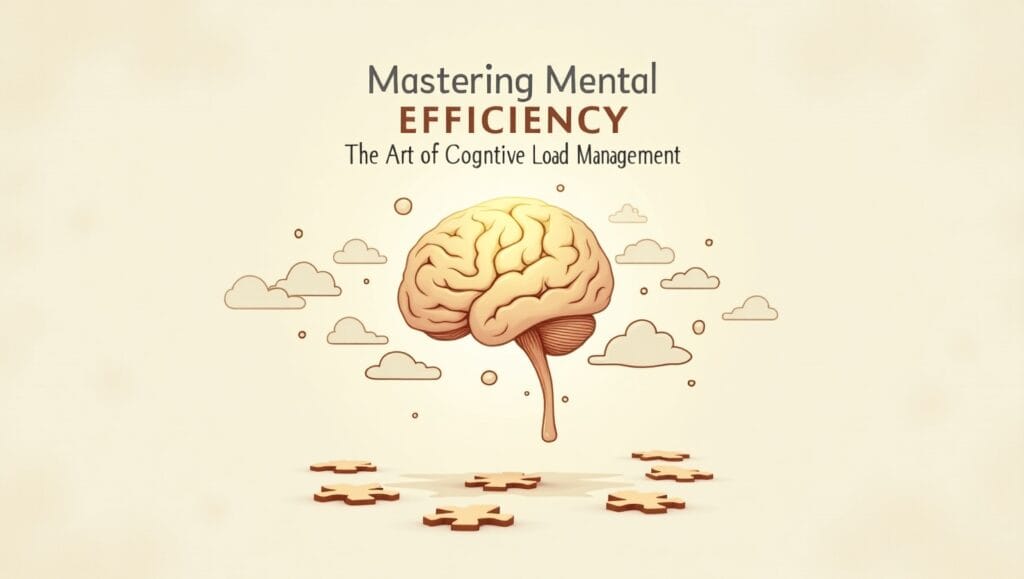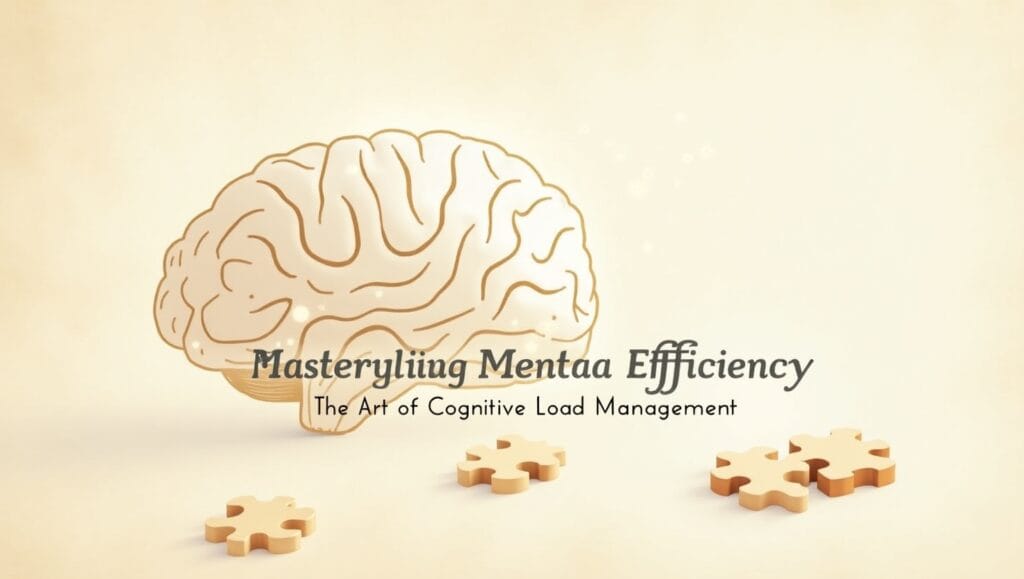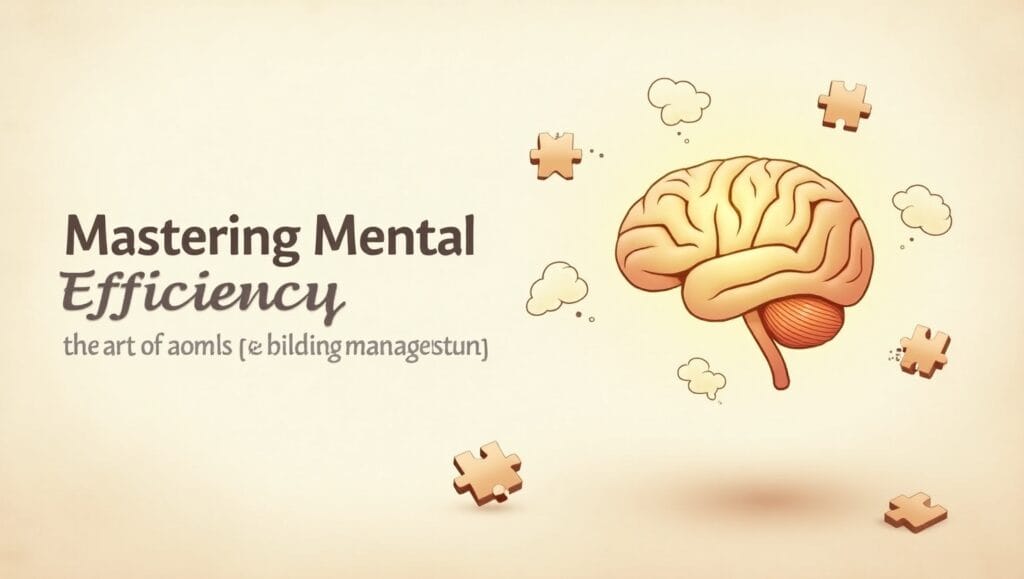Cognitive Load Management: Enhancing Productivity and Learning
In the present day and time when we are so busy and we receive every bit of information and the tasks we are given, people have gotten tired of their minds and are not very efficient. The term refers to this phenomenon: cognitive load is the amount of mental effort being used in working memory. An effective management of cognitive load is therefore essential to optimizing learning and productivity.
Understanding Cognitive Load
Cognitive load theory, introduced by John Seller in the late 1980s, proscribes that only a finite amount of information can be held and worked on at one time in the working memory. Exceeding this capacity can act as impediments to learning and performance. Ways in which the cognitive load could be categorized are cognitive load types: sensory, physical, and mental loads.

Inherent difficulty associated with a particular topic to be taught.
This is the load imposed by the way in which the information is presented to learners.
Mental effort towards processing/constructing/automating schema, as needed.
These loads need to be balanced for effective learning, task execution, or from overloading working memory.
Strategies for Managing Cognitive Load
But using effective strategies it is possible to manage cognitive load and hence improve focus and productivity. Here are several approaches:

- Simplify Information Presentation
Extraneous load reduction corresponds to removal of unnecessary information complexity added to the delivery. To saving time and preserving many dynamic elements, and the other vital features this may be done by eliminating the empty words, unnecessary graphic and animation etc. which is not related to the learning goals. By keeping the content essential only, we direct the learner’s mental resources to understand and retain them.
- Focus on Single Tasks
As multitasking increases the cognitive load and brings down the efficiency. To further process and perform the task better, it is the best to focus on one task at a time. Finally, this approach saves mental effort needed to switch between tasks and so saves cognitive resources.
- Break Down Complex Tasks
Segmenting large amounts of intrinsic load can help to manage it through breaking the task into smaller parts. This strategy allows one to process information in chunks which is easier for the individual to understand and retain. This process may be facilitated by providing learners step by step instructions or by scaffolding.
- Minimize Distractions
Too much clutter in an environment can contribute to extraneous cognitive load. Keeping your workspace tidy, not getting distracted by notifications, and scheduling the times when you deal with emails are some of the ways to avoid being distracted. When people are surrounded by a number of distractions, it decreases the number of mental resources they have to bring to bear on a task.
- Use of effective Visual and Auditory Cues
If relevant visuals and auditory elements can assist in information processing, then this needs to be incorporated. Yet, one must take care not to overload one solitary sensory channel. For example, the combination of spoken word and images can help the learner learn without becoming inundated with more than they can process.

- Encourage Active Learning
Learners are engaged through interactive activities, for example, problem solving tasks or discussions, which also enhances deeper processing. Active learning leads to schema construction, which is conducted in a way as to enhance germane load in a positive manner. As a result, it allows for a better retention of knowledge and a better application of it.
- Implement Time Management Techniques
Time that is managed well can be spent evenly distributing cognitive load. To prevent the overload of working memory, one may decide to use the technique of time blocking which involves consolidating certain amounts of time for certain tasks.
- Leverage Technology Wisely
Technology can help us become more productive, but we should be mindful of when we should and shouldn’t be using it to avoid being overloaded with information. Managing cognitive load can be done through using apps that organize tasks and schedules. But it is important that these tools did not complicate processes but simplified them.
Frequently Asked Questions (FAQs)
Q1: What is cognitive load?
A1: Working memory is the place where mental effort is being applied to or referred to as the cognitive load. Cognitive load is a resource that must be managed to ensure effective learning and productivity.
Q2: What effect does multitasking have to our cognitive load?
A2: Multitasking introduces load to the brain by forcing it to deal with multiple tasks, which decreases the efficiency of your brain and leads to mental fatigue. It is more effective to do one thing at a time.
Q3) Is technology useful in controlling cognitive load?
Q3: Yes, it is much easier to use technology and stay away from unproductive panic mode when you are organized, and technology helps in keeping everything in order and reducing the cognitive load. Nevertheless, do not overly rely in various tools as they tend to complicate processes.
Download Q4: What is the role of environment in cognitive load?
A4: Unclutter of noisy environment can increase extraneous cognitive load by creating noise and distraction. A neat and quiet workspace is kept where you can focus mental resources on the task.
Q5: Applying cognitive load management in teaching by educators?
A5: Educators can manage the cognitive load of students by keeping the information presented clearly, reducing complex topics, and motivating students to be engaged in active learning which ultimately helps them to understand and retain well.

Conclusion
As one of the most effective ways to improve learning, and productivity, managing cognitive load is important. Instead, individuals can optimize their mental resources and improve their performance by employing such strategies as simplifying information presentation, focusing on one thing at a time, minimizing distractions and making good use of technology. By understanding and applying cognitive load management techniques, situations can be better performed by reducing mental fatigue leading to enhanced application of your skills resulting in overall good performance.